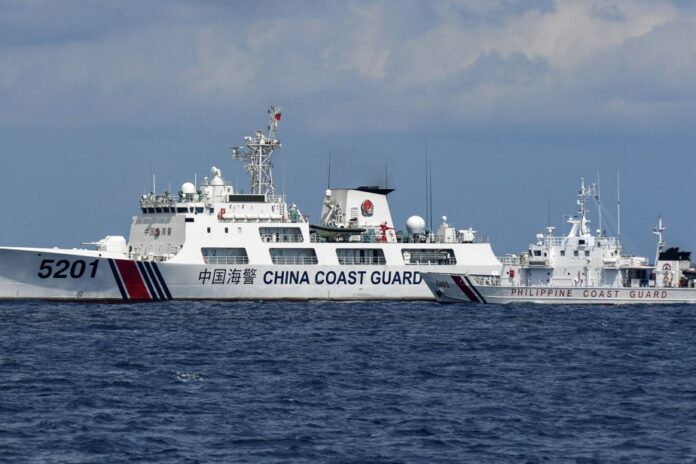(Aboard the BRP Malabrigo) In disputed waters in southern China, a Chinese coast guard vessel cut off the route of a Philippine vessel which narrowly avoided collision, an AFP team found.
“We would have collided on the bow if I hadn’t cut the engine and engaged the reverse gear,” said Rodel Hernandez, commanding officer of BRP Malapuasca, a Philippine Coast Guard vessel.
For six days, an AFP team was invited aboard the BRP Malabrigo, another Philippine vessel, to participate in a patrol over 1670 kilometers, passing through a dozen islands and reefs.
During this period, Chinese ships and coastguards repeatedly appeared, followed them, and ordered them to leave.
The episode, which Commander Hernandez described as a clash between “David and Goliath”, occurred on Sunday in the South China Sea, which Beijing claims almost all of.
The Malabrigo and Malapuasca were headed for the Second Thomas Shoal Reef, where the Philippine Navy is stationed to assert its territorial claims.
The 44-meter-long Malapascua was close to the reef when suddenly a Chinese Coast Guard vessel more than twice its size cut her way.
The distance between the Chinese ship and the Filipino ship was only 45 meters at that time, said Commander Hernandez. This is the first time he has witnessed such a scene: the collision was close.
Only his speed of action made it possible to avoid this tragedy, he assured.
AFP observed, on the edge of the Malabrigo less than a kilometer away, the course of events.
A second Chinese vessel was nearby.
According to Commander Hernandez, the Chinese boats regularly interfere, but on Sunday the rival vessels were “the closest” to a collision.
The Malapascua and the Malabrigo had however signaled their intention to navigate in this sector, specifying that they wanted to carry out a “site survey” there. They had asked the Chinese ships to “stay clear”.
A request ignored by the Chinese coastguard who retorted that the two vessels were sailing illegally and urged them to leave.
The Second Thomas Shoal reef is about 200 kilometers from the large Philippine island of Palawan and more than a thousand kilometers from the Chinese island of Hainan.
“If we relax our surveillance, they will soon take control of Ayungin (Filipino name for the reef, editor’s note). We must therefore be present at all times and challenge their harassment, ”insists Rodel Hernandez.
The incident came a day after Chinese Foreign Minister Qin Gang visited Manila, precisely aimed at defusing tensions in those disputed waters.
Litigation in the South China Sea is not uncommon. Beijing claims almost all of this sea, including the Spratly Islands, ignoring an international judgment that its claims have no legal basis.
Thus China has redeveloped and militarized, over the past ten years, thousands of hectares of reefs in the archipelago where landing strips, ports and radar systems have grown.
On Saturday, the Philippine Coast Guard identified more than 100 Chinese vessels moored on the Whitsun Reef, which Manila considers part of its exclusive economic zone.
These ships were called upon to retreat, to no avail.
Since assuming the Philippine presidency last June, Ferdinand Marcos Jr “Bongbong” has vowed that he will not let China encroach on his maritime rights.
To do this, he seeks to improve relations with the United States, his long-time ally, damaged by his predecessor Rodrigo Duterte.
Cooperation between Manila and Washington in the South China Sea has accordingly intensified: in early April, the Philippines made available to the United States four new military bases, including a naval base not far from Taiwan, to the chagrin from Beijing.
For their part, the Philippine Coast Guard is mobilizing to draw international attention to China’s activities in this disputed sea.
But with only three patrol boats to monitor these vast bodies of water, it’s a challenge, said Jay Tarriela, Philippine Coast Guard spokesman for the Western Philippine Sea.
Sailing on the high seas, the captain of the Malabrigo, Commander Julio Colarina, does not want to be discouraged.
“The Philippines may be a small nation, but our country has a coast guard with a big heart, eager to serve the Filipino people, (while) showing extraordinary loyalty and bravery to protect” archipelago, he says.


















